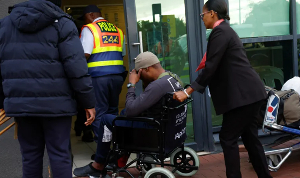In the latest report of the FAO (Food and Agricultural Organization) titled ³The State of Food Insecurity in the World 2011² they continue to highlight the importance of the twin track approach improving both short-term access to food and food production in the medium term in achieving long-lasting improvements in food security.
The question that citizens and governments must ask themselves is whether a ³twin track² policy is indeed being pursued, or whether one track mindedness is causing unnecessary suffering for consumers. The same applies to Ghana.
It is important to note that the global food crisis is continuing to wreak havoc in both developing and developed nations.
In November 2011 Food and Agricultural Organisation (FAO) Director General Jacques Diouf said governments must assist consumers due to the continued global food crisis and high prices. He emphasized that national or regional safety nets, possibly featuring emergency food reserves, could help assure food supplies to the needy during crises.
A recent bi-annual report by African Monitor, a pan-African organisation with continent-wide coverage, that examines and keeps track of commitments made by African governments and their development partners, indicates that only seven African countries (out of 45 for which data is available) Burkina Faso(20%), Ethiopia, Guinea, Mali, Malawi, Niger(15.1%) and Senegal are spending over 10% of their total national budgets in the agricultural sector.
Another ten are spending 5-10%, with the median expenditure being just 4.1%. But there are 29 countries that spend less than 5% of their total expenditure on agriculture. Ghana claims that it will be spending 10% in 2012, with a high percentage of that going towards salaries and wages.
According to the FAO Report investment in agriculture and improving resilience among farmers remain key to providing sustained access to food for all and reducing vulnerability to price volatility and natural disasters such as drought. This is one side of the ³twin track² approach, namely the long-term side.
Improved seeds and farm management techniques, as well as irrigation and fertilizer, that sustainably increase productivity and reduce production risk must be delivered to farmers, especially smallholders, by both the private and the public sector.
Governments must ensure that a transparent and predictable regulatory environment is in place, one that promotes private investment and increases farm productivity. We must reduce food waste in developed countries through education and policies, and reduce food losses in developing countries by boosting investment in the entire value chain, especially post-harvest processing. More sustainable management of our natural resources, forests and fisheries are critical for the food security of many of the poorest members of society.
Although the government in Ghana has made a lot of noise about investing in agriculture, a 2010 report by UNESCO implicate that the investment in science and technology by Ghana falls well short of commitments made at the African Union Summit in Maputo in 2003.
Maybe it is time that the true facts and commitments made by the Ghana government is questioned. If it is true that the needed funds are not committed, it spells a grave future for Ghanaians in the long term.
The FAO furthers says that in the short term, it is critical to design cost-effective safety nets that deliver the right targeted assistance to the right people at the right time. These short-term interventions are important to poor families because even temporary interruptions in intake of energy, protein, vitamins and minerals during the first 1 000 days of a child¹s life can lead to permanent reductions in cognitive capacities and, hence, earnings potential.
In some cases, this will be consumers whose disposable income is severely affected by higher food prices. In other cases, it will be poor smallholder farmers who need help to cope with high input prices that, in the absence of well-functioning credit markets, may prevent these farmers from boosting their production and providing much-needed supplies on domestic and global markets, as well as increasing their income.
A worrisome factor in Ghana is still the dogged refusal by the Ghana government to support consumers in areas such as duties and taxes on foodstuff. Although basic foodstuff produced in Ghana is exempt from VAT, imported basic foodstuff such as cooking oil and rice is subject to extremely high import duties - in fact 37% compared to tariffs in the Ivory Coast of only 12.5%.
The fact is that food is food, whether produced locally or imported. It is not the fault of the Ghanaian consumer that Ghana can only supply 30% of local rice demand - a figure that is expected to decrease further despite propaganda by the government.
In South Africa, for example, this distinction does not exist. The government there realises that, if food must be imported because of local deficiencies, it is the duty of the government to still support the consumer.
The long-term policy - it is indeed a long-term policy - to reduce reliance on imported foodstuff such as rice should not be confused with food security and consumer suffering in the short term. To achieve self-sufficiency a lot more investment will be required and it will take time.
If, as the UNESCO Report indicates, this investment in agriculture is not enough in Ghana, the fallacy of trying to protect the local industry through high import duties just indicates a government that have lost connection with its people.
The motivation by the government that high import duties on basic foodstuff is to protect and promote local producers also just do not hold water. In a country such as India who is a net exporter of rice high duties make sense, but in Ghana where the industry is in its ³infancy², it makes no sense at all.
As long as governments such as the one in Ghana has a ³one track mind² about how to ensure food security while its citizens suffer, the continent will stay at risk not only as far as food security is concerned, but also as far as voter contentment is concerned.
The time has indeed arrived where the debate on government policies must be escalated to a higher level. We owe it to the poor and to our children and their children who will bear the brunt of ³one track mindedness².
Opinions of Wednesday, 23 November 2011
Columnist: Food Security Ghana
Food Security Ghana: Is Ghana¹s Govt One Track Minded?
Entertainment













